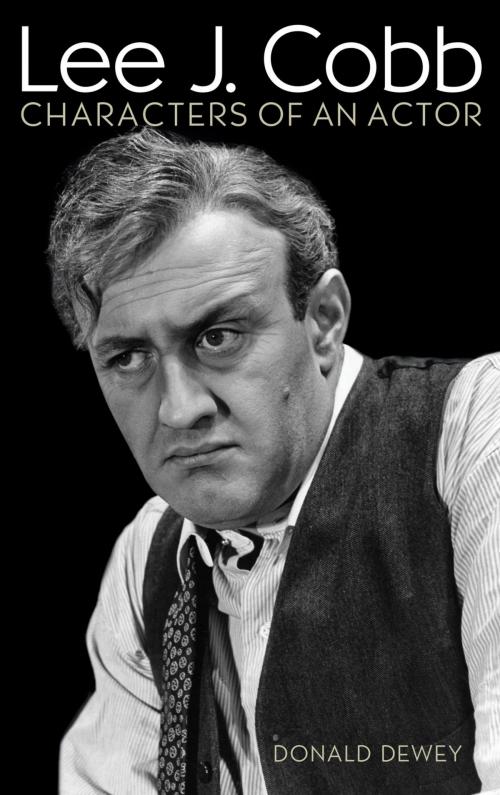Lee J. Cobb
Characters of an Actor
Nonfiction, Entertainment, Film, History & Criticism, Performing Arts, Biography & Memoir, Entertainment & Performing Arts| Author: | Donald Dewey | ISBN: | 9780810887725 |
| Publisher: | Rowman & Littlefield Publishers | Publication: | February 18, 2014 |
| Imprint: | Rowman & Littlefield Publishers | Language: | English |
| Author: | Donald Dewey |
| ISBN: | 9780810887725 |
| Publisher: | Rowman & Littlefield Publishers |
| Publication: | February 18, 2014 |
| Imprint: | Rowman & Littlefield Publishers |
| Language: | English |
For many of his theater contemporaries, Lee J. Cobb (1911–1976) was the greatest actor of his generation. In Hollywood he became the definitive embodiment of gangsters, psychiatrists, and roaring lunatics. From 1939 until his death, Cobb contributed riveting performances to a number of films, including Boomerang, On the Waterfront, The Brothers Karamazov, 12 Angry Men, and The Exorcist. But for all of his conspicuous achievements in motion pictures, Cobb’s name is most identified with the character Willy Loman in the original stage production of Arthur Miller’s Death of a Salesman (1949). Directed by Elia Kazan, Cobb’s Broadway performance proved to be a benchmark for American theater.
In Lee J. Cobb: Characters of an Actor, Donald Dewey looks at the life and career of this versatile performer. From his Lower East Side roots in New York City—where he was born Leo Jacob—to multiple accolades on stage and the big and small screens, Cobb’s life proved to be a tumultuous rollercoaster of highs and lows. As a leading man of the theater, he gave a number of compelling performances in such plays as Golden Boy and King Lear. For the Hollywood studios, Cobb fit the description of the “character actor.” No one better epitomized the performer who suddenly appears on the screen and immediately grabs the audience’s attention. During his forty-five-year career, there wasn’t a significant star—from Humphrey Bogart and James Stewart to Paul Newman and Clint Eastwood—with whom he didn’t work.
Cobb was also followed by controversy: he appeared before the House Un-American Activities Committee in the 1950s and was a witness to a movie-set murder case in the 1970s. Through it all, he never lost his taste for fast cars and gin rummy. A bear of a man with a voice that equally accommodated growls and sibilant sympathies, Cobb was undeniably an actor to be reckoned with. In this fascinating book, Dewey captures all of the drama that surrounded Cobb, both on screen and off.
For many of his theater contemporaries, Lee J. Cobb (1911–1976) was the greatest actor of his generation. In Hollywood he became the definitive embodiment of gangsters, psychiatrists, and roaring lunatics. From 1939 until his death, Cobb contributed riveting performances to a number of films, including Boomerang, On the Waterfront, The Brothers Karamazov, 12 Angry Men, and The Exorcist. But for all of his conspicuous achievements in motion pictures, Cobb’s name is most identified with the character Willy Loman in the original stage production of Arthur Miller’s Death of a Salesman (1949). Directed by Elia Kazan, Cobb’s Broadway performance proved to be a benchmark for American theater.
In Lee J. Cobb: Characters of an Actor, Donald Dewey looks at the life and career of this versatile performer. From his Lower East Side roots in New York City—where he was born Leo Jacob—to multiple accolades on stage and the big and small screens, Cobb’s life proved to be a tumultuous rollercoaster of highs and lows. As a leading man of the theater, he gave a number of compelling performances in such plays as Golden Boy and King Lear. For the Hollywood studios, Cobb fit the description of the “character actor.” No one better epitomized the performer who suddenly appears on the screen and immediately grabs the audience’s attention. During his forty-five-year career, there wasn’t a significant star—from Humphrey Bogart and James Stewart to Paul Newman and Clint Eastwood—with whom he didn’t work.
Cobb was also followed by controversy: he appeared before the House Un-American Activities Committee in the 1950s and was a witness to a movie-set murder case in the 1970s. Through it all, he never lost his taste for fast cars and gin rummy. A bear of a man with a voice that equally accommodated growls and sibilant sympathies, Cobb was undeniably an actor to be reckoned with. In this fascinating book, Dewey captures all of the drama that surrounded Cobb, both on screen and off.















